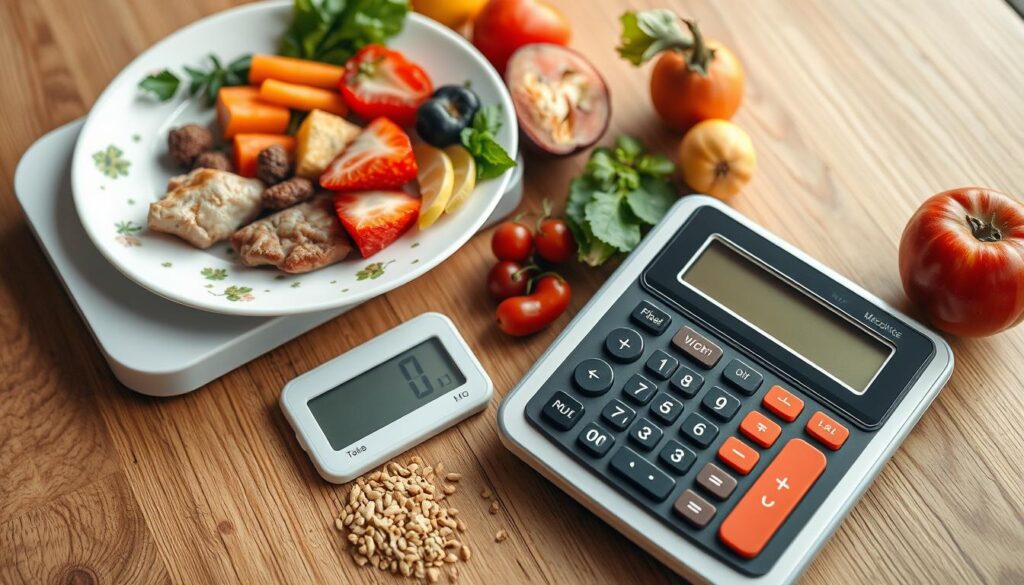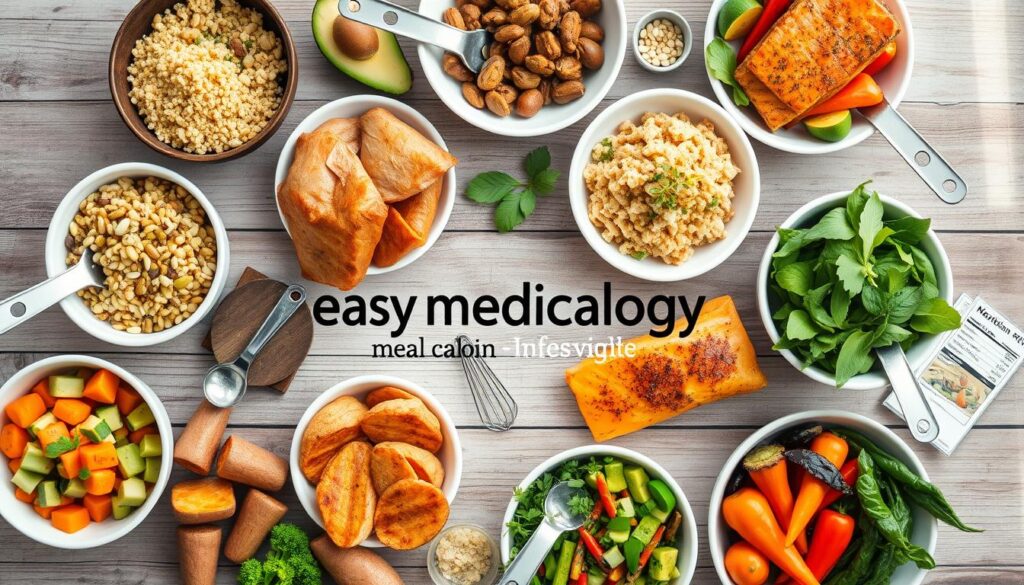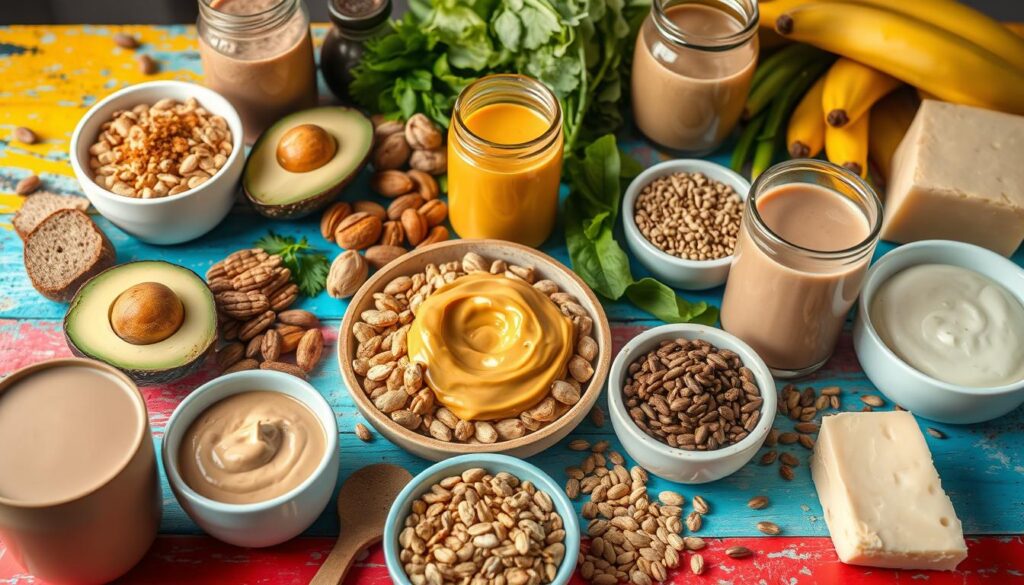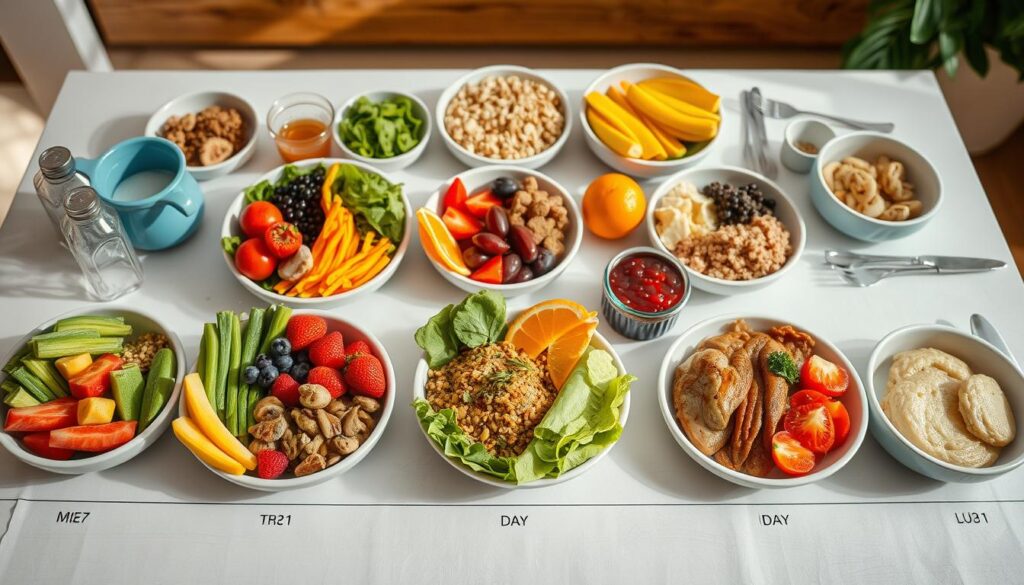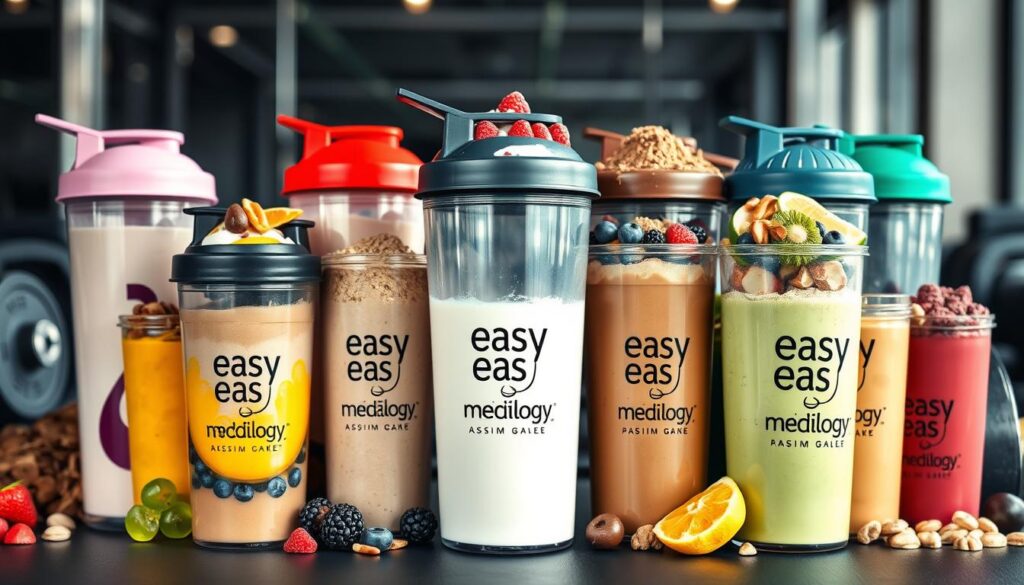Weight Gain Meal Plans: Build Your Perfect Diet
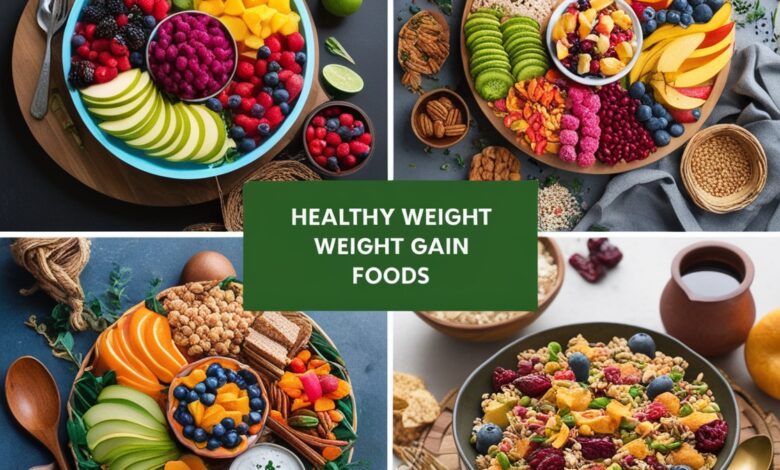
Gaining weight in healthy way can be tough. It feels like a big challenge to add pounds in a healthy way. But, it doesn’t have to be hard. With the right meal plans, you can change your body and hit your fitness goals, one tasty meal at a time.
In this guide, we’ll look into the science of weight gain. We’ll talk about the nutrients and strategies for building muscle and gaining mass. Whether you’re an athlete or just want to feel more confident, these meal plans will guide you to success.
Key Takeaways
- Discover the ideal calorie surplus for healthy weight gain
- Learn how to calculate your personal daily caloric needs
- Explore the essential macronutrients for muscle growth and mass building
- Uncover a structured 7-day meal plan to support your weight gain goals
- Discover the best high-calorie, nutrient-dense foods to incorporate into your diet
Understanding the Basics of Weight Gain
Gaining weight is simple: eat more calories than you burn. This is called a caloric surplus. It’s key for healthy weight gain. Knowing how weight gain works helps you make a plan to reach your goals.
Whether you want to build muscle, recover from illness, or gain weight, it’s all about the right balance. You need to eat more and exercise right to support your goals.
The Science Behind Weight Gain
When you eat more calories than you need, your body stores the extra as fat. This fat can be used for energy or turned into muscle with strength training. The goal is to find the right balance of food and exercise for your weight gain.
Caloric Surplus and Its Role
To gain weight, you need a calorie surplus of 300-500 calories a day. This means eating more than you burn through daily activities and exercise. Eating every 3 hours and including protein and healthy fats in all meals helps.
Common Reasons for Weight Gain Goals
- Building muscle mass through strength training
- Recovering from illness or medical conditions that have led to unintended weight loss
- Addressing an underweight or low body weight condition
It’s important to focus on calorie-dense and nutrient-rich foods for weight gain. Avoiding ultra-processed foods is better for your health. This way, you can gain weight in a healthy and sustainable way.
Calculating Your Daily Caloric Needs
Finding out how many calories you need daily is key to a good weight gain plan. Start by multiplying your weight by 12 to find your resting metabolic rate (RMR). This shows how many calories your body burns when you’re not moving.
Then, think about how active you are to figure out your total daily calorie needs. For gaining weight, you should eat 5-10% more calories than you burn. A dietitian can tailor a plan for you, considering your goals and how active you are.
| Metric | Value |
|---|---|
| Calorie Calculator Coverage | Age range: 15 to 80 years Gender: Male and Female |
| Calorie Calculation Equations | Mifflin-St Jeor Equation, Revised Harris-Benedict Equation, Katch-McArdle Formula |
| Activity Factor Range | 1.2 to 1.95 |
| Weight Change Estimate | 1 pound (0.45 kg) = 3,500 calories Lose 1 lb per week = 500 calorie reduction per day Lose more than 2 lbs per week is generally unhealthy |
It’s important to eat a balanced diet for lasting weight gain. By knowing your calorie needs and making smart food choices, you can gain weight in a healthy way.
Check Your Calorie Here.
Tools like the Eat This Much app can help find your exact calorie needs and create meal plans just for you. With over 21,000 reviews and a 4.7 rating, it’s a reliable tool for those looking to gain weight.
“The Eat This Much app has been a game-changer for me. It helped me gain 35 lbs in just a few months by providing a customized meal plan that fit my dietary preferences and schedule.”
Essential Nutrients for Healthy Weight Gain
To gain weight healthily, balance your macronutrients – protein, carbs, and fats. These nutrients fuel your body, build muscle, and help you gain weight.
Protein Requirements for Muscle Growth
Protein is key for muscle growth. Aim for 75-263 grams of protein daily, based on your calorie needs. Protein-rich dishes like lean meats, eggs, and dairy are great. Also, include macro-friendly meals with beans, lentils, and quinoa for muscle growth.
Carbohydrates and Their Importance
Carbs give you energy for workouts and daily life. A 3,000-calorie diet needs 375-563 grams of carbs daily. Choose high-protein meals with whole grains, fruits, and veggies for nutrients and fiber.
Healthy Fats for Weight Gain
Fats are important for hormone production and provide calories for weight gain. Aim for 67-133 grams of healthy fats from avocados, nuts, seeds, and oily fish. These foods are full of nutrients and help you reach calorie goals without empty calories.
Balance protein, carbs, and healthy fats for a macro-friendly diet. This diet fuels your body and supports healthy weight gain. Eat a variety of protein-rich dishes and high-protein meals every day to see the best results.
“Consuming 3,000 calories per day from whole, unprocessed or minimally processed foods is recommended for weight gain.”
| Nutrient | Recommended Daily Intake |
|---|---|
| Protein | 75-263 grams |
| Carbohydrates | 375-563 grams |
| Healthy Fats | 67-133 grams |
Weight Gain Meal Plans: Structured Approach
Getting to a healthy weight gain needs a plan for meals. A balanced diet with lots of calories is key. This helps you reach your weight gain goals. A good meal plan means you eat the right amount of calories every day.
Your meal plan should have three main meals and 2-3 snacks. This keeps you in a calorie surplus. It gives your body the nutrients it needs for muscle growth and weight gain. Eating a variety of whole foods like lean proteins, complex carbs, and healthy fats is important.
Meal prepping can really help with weight gain. It lets you stick to your calorie plan and avoid bad choices. This saves time and keeps you focused on your weight gain plan.
Remember, your weight gain journey is unique. It’s important to talk to a registered dietitian or healthcare professional for a meal plan that fits you. With a good meal plan, you can gain weight in a healthy way.
Best Foods for Building Mass
To gain weight and build muscle, focus on foods that are both calorie-dense and nutrient-dense. These foods give you the calories you need to build muscle. They also provide important vitamins, minerals, and macronutrients for health and recovery.
High-Calorie Whole Foods
Choose calorie-dense whole foods like nuts, nut butters, avocados, olive oil, and dried fruits. These foods are full of healthy fats and calories. For instance, a handful of almonds or a tablespoon of peanut butter can add lots of calories to your diet.
Nutrient-Dense Options
It’s also important to include nutrient-dense foods in your diet. Lean meats, oily fish, whole grains, and legumes are great choices. They offer a good balance of proteins, complex carbs, and essential vitamins and minerals for muscle growth and health.
Strategic Snacking Choices
Snacking can help you gain weight and build muscle. Choose nutrient-dense snacks like Greek yogurt with granola, cheese and crackers, or fruit with nut butter. These snacks boost your daily calorie intake and provide valuable nutrients.
| Calorie-Dense Foods | Nutrient-Dense Foods | Strategic Snacks |
|---|---|---|
| Nuts, nut butters | Lean meats, oily fish | Greek yogurt with granola |
| Avocados | Whole grains (oats, brown rice) | Cheese and crackers |
| Olive oil | Legumes (beans, lentils) | Fruit with nut butter |
| Dried fruits | Leafy greens, vegetables | Cottage cheese and berries |
By mixing calorie-dense foods, nutrient-dense options, and smart snacking, you can make a balanced meal plan. This plan will help you gain weight and build muscle effectively.
Meal Timing and Frequency
Timing and frequency of meals are key for weight gain. Eating regularly helps keep a calorie surplus. This supports your weight gain goals.
Go for 3 main meals and 2-3 healthy snacks a day. This meal frequency keeps your metabolism going. It also ensures a steady flow of nutrients to your body. Eat every 3-4 hours to avoid hunger and improve nutrient absorption.
It’s important to time your protein intake around workouts. Eating a protein-rich meal or shake before and after exercise helps with muscle growth and recovery. This eating schedule boosts the benefits of your weight training.
“Eating regularly throughout the day is key to maintaining a calorie surplus for weight gain. Don’t skip meals – fuel your body consistently to see the best results.”
The best meal timing and frequency vary by person. Generally, eat every few hours to keep your metabolism and energy up. Try different patterns to find what suits you best.
Consistency is crucial for weight gain timing. A reliable eating schedule helps you achieve your desired physique.
Building Your 7-Day Meal Plan
Creating a 7-day meal plan is key to gaining weight. It helps you eat the right amount of calories and nutrients. Here are some tasty breakfast, lunch, dinner, and snack ideas for your meal plan.
Breakfast Options
- Protein-packed pancakes made with oats, eggs, and protein powder
- Hearty oatmeal with nuts, seeds, and fresh fruit
- Nutrient-dense egg dishes, like scrambled eggs with avocado and whole-grain toast
Lunch and Dinner Ideas
Main meals should have lean protein, complex carbs, and healthy fats. Here are some great options:
- Grilled chicken breast with roasted sweet potatoes and sautéed spinach
- Baked salmon over quinoa and steamed broccoli
- Beef and vegetable stir-fry with brown rice
Snack Combinations
High-calorie snacks are important for weight gain. Try these:
- Greek yogurt with granola and berries
- Trail mix with nuts, seeds, and dried fruit
- Nut butter on whole-grain toast with banana slices
Creating a good 7-day meal plan is about finding what works for you. Mix these ideas to meet your weight gain goals and enjoy your food.
“Consistency is the key to building muscle and gaining weight. A well-structured 7-day meal plan can help you stay on track and ensure you’re fueling your body with the right nutrients.
Mass Gainer Supplements and Their Role
Mass gainer shakes can be a great help when you’re trying to gain weight. They pack a lot of calories, protein, and other important nutrients. These help grow muscles and increase your weight.
Even with a good diet, mass gainer shakes can be useful. They help make sure you get enough calories and nutrients. This is especially true if you find it hard to eat enough food.
But remember, mass gainer shakes should not be the only thing you eat. Eating a variety of whole foods is key. This way, you avoid getting too much of one thing and not enough of others. Always talk to a doctor before adding weight gain supplements to your diet.
| Nutrient | Recommended Daily Intake for Bodybuilding |
|---|---|
| Protein | 1.6 to 2.2 grams per kilogram of body weight |
| Carbohydrates | 3.5 to 5 grams per kilogram of body weight |
| Fats | 0.5 to 1.5 grams per kilogram of body weight |
Using protein supplements wisely and eating a balanced diet will help you reach your weight gain goals. This way, you can grow muscle healthily and sustainably.
“Proper nutrition is the foundation of any successful bodybuilding program. Supplements can be a valuable addition, but they should never replace whole, nutrient-dense foods.”
Common Mistakes to Avoid
Starting your weight gain journey? Watch out for common mistakes that can slow you down. Eating too much junk food, not enough protein, or skipping meals are big no-nos. Focus on whole, nutrient-rich foods for lasting results.
Don’t overlook the importance of portion sizes. Meals should mix carbs, proteins, and fats for muscle growth and health. Skipping meals messes with your metabolism, causing weight swings.
A sedentary life can lead to obesity and heart issues. Make sure to exercise regularly. It helps with weight gain and keeps you healthy. Slow and steady wins the race – don’t rush it.
FAQ
What are weight gain meal plans and how do they work?
Weight gain meal plans use whole foods to help you gain weight healthily. A 7-day meal plan at 2,500 calories is available. You can adjust it for 2,000 or 3,000 calories.
The plan includes recipes for breakfast, lunch, dinner, and snacks. It focuses on fiber-rich grains, lean proteins, healthy fats, fruits, and veggies.
How does weight gain occur, and what are common reasons for wanting to gain weight?
Weight gain happens when you eat more calories than you burn. You need a caloric surplus to gain weight. Reasons include building muscle, recovering from illness, and addressing being underweight.
Focus on foods high in calories and nutrients. Avoid ultra-processed foods for healthy weight gain.
How do I calculate my daily caloric needs for weight gain?
First, find your resting metabolic rate (RMR) by multiplying your weight by 12. Then, add calories based on your activity level. Aim for 5-10% more calories than you need to maintain your weight.
A registered dietitian can help create a plan tailored to your needs and goals.
What are the essential nutrients I need to focus on for healthy weight gain?
For weight gain, balance your macronutrients. Protein is key for muscle repair and growth. Carbs give energy and support muscle glycogen.
Healthy fats are calorie-dense and important for hormone production. Eat foods like oily fish, lean meats, beans, whole grains, and full-fat dairy.
How can a structured meal plan help with my weight gain efforts?
A structured meal plan ensures you get enough calories. Plan for three main meals and 2-3 snacks a day. Include a variety of foods to meet your nutritional needs.
Meal prep can save time and help you stick to your weight gain plan.
What are some of the best foods to focus on for building mass?
Choose calorie-dense whole foods like nuts, nut butters, avocados, olive oil, and dried fruits. Opt for nutrient-dense foods like lean meats, oily fish, whole grains, and legumes.
Good snacks include Greek yogurt with granola, cheese and crackers, and fruit with nut butter.
How important is meal timing and frequency for weight gain?
Eat regularly to keep a calorie surplus. Aim for 3 main meals and 2-3 snacks. Try to eat every 3-4 hours.
Timing your protein intake around workouts can help with muscle growth and recovery.
What does a 7-day weight gain meal plan look like?
A 7-day meal plan offers structure and variety. Breakfasts include protein pancakes, oatmeal with nuts and fruit, and egg-based dishes.
Lunch and dinner feature balanced meals with lean proteins, complex carbs, and healthy fats. Snacks are nutrient-dense and calorie-rich.
When should I consider using mass gainer supplements?
Mass gainer supplements can help if you struggle to get enough calories from whole foods. They offer concentrated calories and nutrients. But, they should not replace a balanced diet of whole foods.
Always talk to a healthcare professional before adding supplements to your diet.
What are some common mistakes to avoid when trying to gain weight?
Avoid relying too much on junk food, neglecting protein, or not eating often enough. Don’t forget the importance of nutrient-dense foods over empty calories.
Stay consistent with your meal plan and don’t skip meals.
